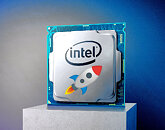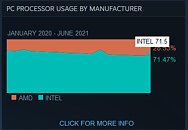Wednesday, July 7th 2021

Intel Regains CPU Market Share that it lost to AMD, Latest Steam Hardware Survey
Valve has released its Steam Hardware Survey results for the month of June, and as always, it is a pretty good indication of the gaming market and market trends, showing us just how well the companies providing hardware are doing. On the CPU front, there are two companies constantly fighting for market domination: Intel and AMD. A bit over a month ago, we reported that AMD made serious progress in taking the market share away from Intel, using its latest Ryzen 5000 series of processors. However, this time, the effect seems to be reversed by its competitor, Intel.
All the gains AMD has made in the past few months have been sort of "erased" by Intel, as team blue managed to get back to a point where AMD now holds 28.41% of the CPU market, while Intel is back to over 70% share, more specifically 71.58%. What this means is that there are some fluctuations happening right now, and we are eager to see more reports to analyze in what direction is the market moving and how the two competing companies are performing. AMD seems to be held back by their ability to produce enough CPUs, while Intel is happily filling that void, fueled by a more aggressive pricing strategy.
Source:
Steam Hardware Survey
All the gains AMD has made in the past few months have been sort of "erased" by Intel, as team blue managed to get back to a point where AMD now holds 28.41% of the CPU market, while Intel is back to over 70% share, more specifically 71.58%. What this means is that there are some fluctuations happening right now, and we are eager to see more reports to analyze in what direction is the market moving and how the two competing companies are performing. AMD seems to be held back by their ability to produce enough CPUs, while Intel is happily filling that void, fueled by a more aggressive pricing strategy.


99 Comments on Intel Regains CPU Market Share that it lost to AMD, Latest Steam Hardware Survey
Dont get me wrong, im planning to go for Alderlake myself should that turn out to be worth a damn (its just a weird piece of tech for what we know so im interested)....but like if I had to get something now I would never ever go for Intel, thats just rediculous..(well unless the price is extremely agreable I guess).
surveyBS :shadedshu:They're about as reliable as some of those Pew Pew surveys!
90% of people don't even need a 5600X.
Intel 10th Gen with heavy discount is far more appealing to the mass-market at 1/3rd the price and as far as they're concerned Windows, Minecraft, Chrome, and Spotify all run just fine.
Plus notebooks too, Intel is a lot more competitive there and in general has a lot more notebooks.
Used to be 79% in 2020, hell it was 81% a few months back. and now it regained 1.72% compared to what??, last month.
Still, Tiger Lake-H is no doubt selling well - Intel has a good relationship with all laptop makers, and are good at marketing their products (read: spend tons of money on marketing). There's also no doubt a lot of people looking into gaming laptops due to the desktop GPU drought, in addition to the already large gaming laptop market. So while AMD no doubt has a bigger market share in mobile than previously, these laptops are no dobut selling well. Most of those CPUs also fall in the base clock frequency range where the increase is according to the survey.
There have been plenty of well-documented blind A-B tests where people have to guess whether they're using a budget SATA SSD or a high-end NVMe SSDs. People genuinely can't tell the difference and the run-to-run variance in application load times, level loads, and system 'snappiness' is bigger than the actual average measured differences between SATA and PCIe 4.0 NVMe drives anyway.
The bottleneck is often not the storage, but the application or an internet DRM/licensing/content server you have no control over. Waiting 10% longer when the wait is only 1.5 seconds isn't enough to make a meaningful difference, and in laptops especially the potential for streaming huge files between two fast NVMe drives practically doesn't exist, the file transfer will happen at the speed of the slower source/destination drive, likely to be either spinning rust, an internet connection, or a USB flash drive in the case of a laptop.
Situation is much worse if you try to find RDNA2 notebook.
for past 1,5 year, AMD went totaly AWOL with it's pricing, aswell ignoring stock issue... by releaseing even more and more new products, while they are not even able to substain what they released already
While even with it's flaws... Intel CPUs are still easly accesibble, aswell its pricing looks really good - ATM